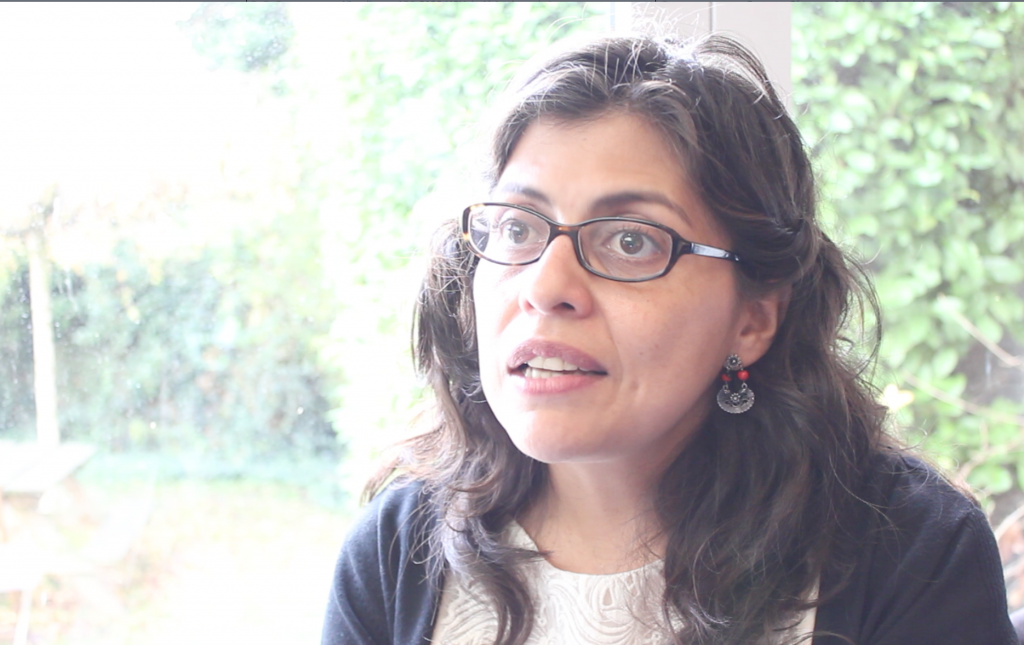Alejandra Ancheita, the newest Laureate of the 2014 Martin Ennals Award for Human Rights Defenders visited Brussels in November 2014. Protection International (PI) was able to sit down with her.
Alejandra, a Mexican lawyer, and human rights activist is the founder and Executive Director of Proyecto de Derechos Economicos, Sociales y Cuturales. Together with ProDESC, she has worked tirelessly with labor workers, migrants, and indigenous communities to protect their land and their economic, cultural, and social rights vis-à-vis transnational companies.
Despite having been subjected to threats, surveillance, and a defamation campaign in the national media, Alejandra and her team work to address human rights violations. Because of her work, she received international recognition and it is hoped this would provide her and the team protection.
Alejandra talked with PI about her motivation, her views on the security of women human rights defenders the Governmental Protection Mechanism, and future prospects of human rights defenders in Mexico.
WHRD security and national protection mechanism in Mexico: Interview with Alejandra Ancheita from Protection International on Vimeo.
Question: How did you become a human rights defender?
Alejandra: Well, I became motivated to work in human rights in Mexico when I was young. Growing up, the two main values my parents instilled in me and my sisters were that human dignity in life is attainable and that one has the right to be treated equally. They taught me that this right does not only apply to a few privileged people.
I grew up with these ideals and continued to be guided and motivated by them throughout my time at University while studying law. I learned to use the law as a tool and to put these two fundamental family lessons – of a dignified life and respect and equality for all – into practice.
Q: How do you stay motivated?
A: I stay motivated despite risks, threats, and even frustration, because I have seen, little by little, increasing access to justice. In a country like Mexico, impunity and corruption are a daily experience. With each small achievement, you renew your conviction of the importance of your work, of the impact that you make, and how it affects others. Others- who normally have no hope of access to justice, as the Mexican government should guarantee it.
_______________________________________________________________________________________
“With each small achievement, you renew your conviction of the importance of your work, of the impact that you make and how it affects others.”
_______________________________________________________________________________________
Q: What are the threats that you face and where do they come from?
A: The threats that I receive are threats intended to disrupt my life and physical integrity. They are directed at me, but also at my team and our relatives. It is very complex to identify where these threats come from and then confront them.
These threats can be very gender-specific when they are directed at women human rights defenders. This has to do with the sexualization of violence towards human rights defenders. Often threats against women defenders consist of using sexual violence or threatening to do so. I believe there is a clear difference between the violence and intimidation exercised against a woman defender and a male defender.
Moreover, threats towards women defenders are almost always carried out as much towards her as to her family. When the security of a woman defender is endangered, as well as her social network’s security, the impact of the threat becomes much more profound.
Q: Are protection and security measures for human rights defenders sufficient in Mexico?
A: No, I believe that current protection measures for human rights defenders in Mexico are insufficient. The National Network of Human Rights Defenders documented around 300 threats and attacks to women human rights defenders this year alone.
_______________________________________________________________________________________________________
“I believe that people working on other protection mechanisms for human rights defenders have to start taking gender into account.”
__________________________________________________________________________________________________________________________________________________
Particularly protection offered by the federal mechanism towards women defenders is insufficient. This mechanism was created and developed from a perspective in which gender specificities were not taken into consideration.
I believe that people working on other protection mechanisms for human rights defenders have to start taking gender into account. Then, mechanisms can be developed that truly address gender nuances and the different vulnerabilities of male and female defenders that could lead to violent and at-risk situations.
Q: How would improved protection measures look like?
A: We need to pay attention to the obligation that the Mexican Government has to protect the work of [male and female] human rights defenders and guarantee conditions concerning their security.
One of the most effective ways to improve protection and security measures for defenders is by bringing them closer to civil society. Protection measures could be improved by using data and information that civil society organizations document. The Mexican government could use this information and use it to shape its policy in a way that better responds to the needs of (women) human rights defenders.
_________________________________________________________________________________________________________________________________________________
“One of the most effective ways to improve protection and security measures is by bringing them closer to civil society.”
__________________________________________________________________________________________________________________________________________________


